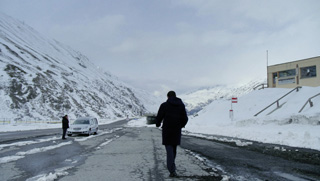Calabria
 SWITZERLAND / 2016 / French, Serbo-Croatian, Portuguese, Italian, Romani / Color, B&W / DCP / 117 min
SWITZERLAND / 2016 / French, Serbo-Croatian, Portuguese, Italian, Romani / Color, B&W / DCP / 117 min
Director: Pierre-François Sauter
Photography: Joakim Chardonnens, Pierre-François Sauter
Editing: Anja Bombelli
Sound: Patrick Becker, Hatsui Masaki
Sound Editor: Jérôme Cuendet
Sound Design: Étienne Curchod
Music: Jovan Nikoli´c, Mirko Golob
Producers: Nadejda Magnenat, Le Laboratoire Central, Hercli Bundi, Mira Film
Source: Nadejda Magnenat
Two men working for a funeral company in Switzerland transport a dead body to Calabria, Italy by hearse. They are the gypsy Jovan, who used to be a singer in his home country of Serbia, and the intellectual José, from Portugal. In the confines of the car, they spontaneously start talking about the world after death, and about life and love—while behind them the corpse of the deceased, from Calabria, lies resting. They each immigrated to Switzerland for different reasons. This paean to life, accompanied by lyrical Gypsy music and delivered with a polished touch, depicts their conversations and the people they encounter on their journey.
[Director’s Statement] I filmed the last wish of an Italian worker who came to Switzerland in the 1970s, looking for a better life, and who asked to be buried in his native village.
Calabria is a tribute to all those men who left Southern Italy to find work elsewhere. Starting from this historical fact, I have taken a wider perspective to include all the people who leave their home country in search of a better life. I also set forth a philosophic view of the passing of time, of the urgent need to enjoy life in the face of the void that is death.
By focusing on Jovan, a gypsy singer, and José, a Portuguese intellectual, I wanted to break away from the clichés about emigrants. My intention is to show that all the people moving around on Earth are not some anonymous human mass: emigrants are always individuals, each with his or her unique and specific path.
I have chosen a pure and simple form for this road movie, settling upon a precise mise en scène. Simple frontal shots create a direct bond between the leading characters and the audience. I would like viewers to concentrate on observing life unfolding before their eyes, while death—which we often forget, although it is always hovering close by—is ever present in the background.
Taking death as its starting point, the film tells about the surprising richness of life.
I wanted to anchor this film in a cinematographic tradition that believes in the suggestive, evocative power of cinema: a cinema that observes life by offering a personal perspective on reality. The form chosen is intended to stimulate the audience’s imagination, inviting viewers to participate in this cinematic experience at a very personal level.
 Pierre-François Sauter
Pierre-François SauterPierre-François Sauter spent his childhood in Mozambique, later living and working in Lisbon, Paris, Brussels, and Lausanne. Early projects included working as director for several programs on national television stations in Belgium and Switzerland (RTBF, SF1-DRS), while since 2003 he has devoted himself to producing and directing his own films. In 2009, he directed Facing the Judge, a documentary that was screened in thirty theatres across Switzerland. He has also worked at printmaking studios in Lausanne and Milan, and his prints have been shown in several galleries in Switzerland. Calabria is his second feature film.
